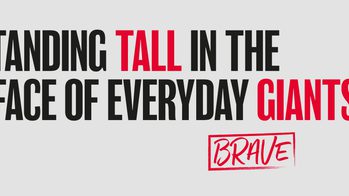WHY STORIES REALLY MATTER
So did you know that as people, the story we tell really matters. Stories help us understand the world, what we've been through, what's going on, what might happen next and most important, how we should or shouldn't act or react. They tell us the way things are likely to play out, and they teach us something about how we want to play them through. And sometimes stories are really helpful. Like recently, when we went into the pandemic situation and the first ever lock down, lots of people shared stories that came from the second world war, the last time they could remember that life changed in a moment just as dramatically as it was then. And those stories helped a lot of people pull together and get through what was a really tough time. But sometimes stories can be more difficult. Like, think of in the pandemic when we all had to get used to having moments where we were asked to isolate. And many of you will have had that experience of suddenly getting the ping or the phone call or the text. And suddenly you're told you cannot leave your home. What stories did we bring to mind in those moments at first when we were getting used to this totally new situation? Well, the only stories that are similar are stories of being locked up or imprisoned. Or stories of being shut in or trapped. And neither of those are helpful stories when you're in isolation, because I mean, you've done nothing wrong. So if you feel like it's a punishment, that's really tough. And to feel trapped just fills you with fear and panic and makes you more anxious. So in those moments, we needed to find better stories to tell, better ways of framing and understanding what we were going through. Stories that lifted us instead of limiting us. Stories that helped. And of course, in a lot of situations, there's more than one story we could tell about the same circumstance. So think about a football match, for example. The same match viewed by two different people. You could hear two completely different stories. I mean, one tells a story of bravery, triumph, celebration. They're absolutely psyched by their story. The other one tells a story of sadness and loss and limitation, of mess ups and disappointment. They're gutted by this story. Why the difference? Well, because of course it depends which team they support. It's not the one is true and one is false. They're both real, they're both versions of what happened. They're both stories you could tell. But the difference is their perspective. Your perspective changes your story. Your understanding of what happened changes your reaction to it, your emotions, and how you move on from a moment that might have been tough. And here the human brain be a pain because did you know that your mind is obsessed with negative stories. Stories that trigger anxiety and upset literally grab your attention. Anxiety makes sure those stories are right at the front of your mind and stay there. You're more likely to think about them, dwell on them, remember them, retell them, and share them with other people. So negative stories spread much better than positive stories. They're the ones we're more likely to hear. The fearful stories, the stories that turned out badly, the stories that focus on all the things we wish weren't true or don't want to happen. Sometimes we have to be really deliberate and careful to tune into and seek out and listen to the better stories. And to help ourselves figure out how do we want to go through this. Instead of just thinking about the things we want to avoid, how do we get where we want to go? Because stories can be really powerful. Imagine that you have to do a tight rope walk like in front of all of your mates. You've never done it before. You've got a little bit of learning time, a bit of practise, but then you're going to have your golden moment. You've got to do it in front of everyone. And you don't know how it's gonna go. I mean, you've practised, but it's risky. This could be an amazing moment. Or you could crash and burn. Which story is going to play out in your mind as you get up and walk over to that tight rope, as you think about what may be coming? I mean, think about it. If you're obsessing about falling and worrying about how people might laugh at you. And then you're getting up onto that tight rope. And as you're doing it, people are yelling things like, "Oh, my goodness," or "Watch out. "And I can't believe you're even gonna try this." That's a negative story that your mind is lingering on. How do you think that's gonna influence your likelihood of getting across the tight rope, of how wobbly you feel in that moment? But now imagine that your mind is lingering on a story that's about how this could go well, how you have done great in practising . You've worked really hard. How you could make it. And now even if you don't, people are gonna be so proud you gave it a go. And then as you stand up, your mates seem to be telling the same story because they're shouting things like, "Yay, look at you." And "Woo, go for it." That is always going to be a better story to be part of. And the weird thing is, it could well change the ending. Because in those moments where life makes us feel wobbly, the story we tell makes all the difference to how well we can hold our nerve, hold our focus and get through that wobbly moment. When we face tough stuff, sometimes life changes in ways we didn't expect, and it can throw us off balance. Sometimes things bust into our life story that we never wanted to be part of it. Maybe someone dies, or you have to move away from your hometown, or you get bullied at school, or you fall ill. Sometimes the hardest part of getting your head around a tough moment in your story is accepting it as part of your story at all, getting beyond the point where you just think, "I don't want this to have happened." Figuring out, how do I bring this into a story that isn't all bad, that isn't just something I don't want to have happened, I don't want to be true? That's a journey. And at first, your head isn't ready for it. You're just reeling and reacting and just managing the shock of what happened. And you need to get to a place where it feels like life has settled down and that initial shaken phase is over. Then you need to start doing the thinking work though. And that's about figuring out, what story is this part of? So how do you do it? How do you figure out what story is playing out when it all seems a mess? Remember, the best stories have chapters. And you might be in one right now that feels like it is about getting through something tough, finding things out about yourself and the world. Learning how to dig deep and get through. Building friendships and relationships that will be there for you even through the worst times. But it's worth thinking, what story could this be part of? What could I be learning from this? What could the next season look like? How could this fit into a bigger picture of my life journey, my life story? And remembering to deliberately focus and ponder, sometimes, the positive stuff instead of the negative that your mind is so easily drawn to. Here's a great piece of ancient advice. It's written in a letter that was written actually way back in the first century by a guy called Paul. It's in the New Testament of the Bible in a book called Philippians. And this is what he said. He said, "Summing it all up friends. "I'd say you do best by filling your minds "and meditating on things that are true, noble, "reputable, authentic, compelling, gracious, "the best, not the worst, the beautiful, not the ugly. "Things to praise, not things to curse." Your mind automatically obsesses on negative stories. And that includes the stories about you. I wonder how much it would change things if you deliberately spent a bit more time thinking about some of those good stories, thinking about the things that were good about you instead of the things that you've messed up. Thinking about the things that have gone well instead of just thinking about the things that hadn't gone the way that you wished they had, thinking about things that were good. Things that are worth celebrating from your day, instead of just the things that are tough. It's not that those things aren't tough, but your brain doesn't need any help telling those stories. What if you took some time to deliberately think about the positive stories instead? I wonder what the next chapter might look like for you. I wonder what it would look like if you told the whole story of your life, instead of just this chapter that you're in, just the rubbish bit, just the mess up bit. Stories really matter.



